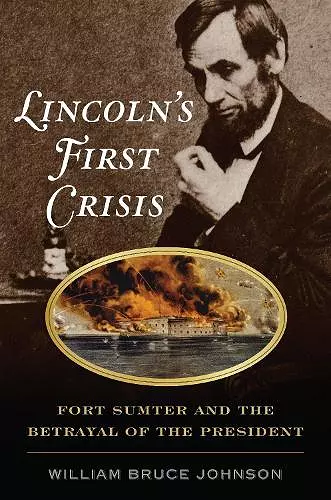Lincoln’s First Crisis
Fort Sumter and the Betrayal of the President
Format:Hardback
Publisher:Stackpole Books
Published:21st Sep '20
Currently unavailable, our supplier has not provided us a restock date

When Abraham Lincoln swore his oath as president on March 4, 1861, the United States was disintegrating. Seven states had seceded, and at least another four and as many as eight remained up for grabs, depending how the new president handled the secession crisis, especially at the flashpoint of Fort Sumter in South Carolina, heart of the rebellion. The fate of the republic quite literally hung in the balance. Lincoln’s First Crisis covers four of the most consequential months in American history, December 1860 through April 1861. The seceded states hoped to maneuver Lincoln into firing the first shots at Sumter and sparking a civil war, and actively worked toward that goal. The Sumter crisis has been hotly debated, and deeply researched, for more than 150 years. In this thoughtful, careful reassessment, Johnson combines thorough research and the latest historiography with a litigator’s methodical analysis and a storyteller’s ear to reconstruct the beginning of the Civil War from the White House to Brooklyn Navy Yard, from Charleston Harbor to Richmond. Through perseverance, principle, and personality, Lincoln bested his rivals and established himself as commander in chief, and even though his actions to relieve Sumter helped spark the war, he did so on his own political, moral, and military terms that helped lay the foundations for meaningful Union victory. Johnson breathes new life into this old, but US-shatteringly important story.
This is an extraordinary book, made so in part by the obvious comparisons between our time and the days occurring just as the Civil War simmered and then exploded into our national history—and into our individual histories. The pace and clarity of the narrative is remarkable. Much of the book's power comes from the use of quotations that place the reader in the middle of things. Such a practice often demonstrates scholarly pretense, but goodness gracious, not so here. Read this book and gain insight (both microscopic and expansive) into our own times. As you read you will—perhaps for the first time—understand why scholars and non-scholars become obsessed with learning about the Civil War, an event that is at once our most profound tragedy and victory. And besides all that, this book uncovers some intriguing new stuff. -- Clyde Edgerton, Professor, UNC Wilmington
ISBN: 9780811739405
Dimensions: 239mm x 164mm x 31mm
Weight: 717g
448 pages